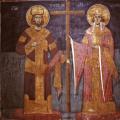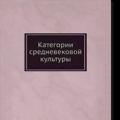Suffix -sk-
In adjectives, when adding the suffix -sk- to the root, the consonant of the root is preserved in some cases, but changes in others.
1. If -sk- is added to a root that ends in d, t, z, s, c (if there is a consonant before the c), then they are preserved: Kyrgyz-sk-y (Kyrgyz), Canadian, Dutch, Scottish, Flemish, Kurdish, abbey, candidate, giant, post office, lieutenant, occupier, amateur, adjutant, Bolshevik, positivist, subjectivist, propaganda, pacifist, Abkhazian, Vosges, Polesie, Circassian, Eskimo, sailor, Palatinate, Constance.
Note. If the root ends in ts (or tsts), which is preceded by a vowel, then the suffix -k- is added to the root: Yeletsky (Elets), Nitstsky (Nice). Exceptions: Graz (Graz), Metz (Metz).
2. If the suffix -sk- is added to a root that ends in k, h, then they change to c, and the letter from the suffix is omitted: miner (gornyak- 4- -ote-; the final consonant of the root k changes to c, and the suffix loses s - miner -f kiy), Cossack, poor peasant, tramp" burlatsky, tavern, fisherman, Slovak, kulak, stupid, bursatsky, Greek, Turkish, peasant, Kalmyk, Permyak, middle peasant, weaver.
3. If the root ends in s, preceded by a consonant, and then followed by the suffix -sk-, then one s in the word is omitted: Ems (Ems), Rheims (Reims), Worms (Worms), Welsh (Wales), etc. Exceptions: Helsingfors (Helsingfors), Daugavpils (Daugavpils), Tammerfors (Tammerfors).
Note. In the adjectives Odessa (Odessa), Cherkasy (Cherkasy) two s are written, since it is not customary to write three s.
4. If the root ends in sk, and then the suffix -sk- follows, then one k in the word drops out (the word is written -sskiy, not “-skskiy”): Damascus (Damascus), San Francisco (San Francisco) , Etruscan (Etruscan). Exceptions: Oscan, Basque.
5. If the root ends in l, and then the suffix -sk- follows, then before the suffix ь is written: Ural (Ural), rural (village), posolsky (ambassador), Portuguese (Portugal), generalskiy (general), angelskiy (angel ), bibliophilic (bibliophile), consular (consul), Mongolian (Mongolia).
If the root ends in н or р, and then the suffix -sk- follows, then ь is not written before it: Astrakhansky (Astrakhan), Sibirsky (Siberia), Gavansky (harbour), konskiy (horse), bogatyrsky (bogatyr), brutal ( beast), clerk (scribe), secretarial (secretary), rebel (rebel), medicine man (witch doctor), plowman (plowman), royal (king), knightly (knight), huntsman (jaeger), monastic (monastery).
Exceptions: month names: June, September. November, etc. (except January)", as well as adjectives formed from Chinese and Vietnamese names that are written with ь: Yunansky, Taiwanese. The expression day-to-day is written with ь.
Suffixes -ev-, -iv-
The suffix -ev-, included in many adjectives, is unstressed: enamel; the suffix -iv- is always stressed: truthful.
The suffix -ev- is included in the following adjectives: aluminum, sodium, potassium, nickel, flannel, crevice, style, pain, lobe, salt, zero, bullet, shadow, armor, rod, root, guest, drinking, mirabelle, fabric, gauze, astrakhan, tulle, ermine, soy, etc. (For the spelling of the suffixes -ev-, -ov- after hissing ones, see §7.)
In the adjectives truthful, arrogant, playful, beautiful, courteous, flattering, etc., the suffix -iv- is written. Exceptions: merciful, gentle, holy fool.
Please note: brown and buckwheat are written with -ev-.
Suffixes -liv-, -chiv-
The suffixes -liv-, -chiv- (in Russian there are no suffixes “-lee-”, €-chev-u>) are written in adjectives: fastidious, restless, whimsical, gluttonous, flirtatious, calculating, sympathetic, envious, compassionate, conscientious , accommodating, forgetful, sympathetic, touchy, resourceful, intrusive, enterprising, talkative, arrogant, picky, reckless.
It is necessary to distinguish between adjectives formed with the suffixes -liv-, -chiv-, and adjectives in which the stem ends in l, h, and then the suffix -ev-. For example, in gutta-percha the letter h belongs to the root, and not to the suffix; in enamel, the letter l also belongs to the suffix.
Suffix -й
If the base of a noun includes the suffixes -nik, -chik, -iki', then the adjective is formed using the suffix -й (a variant of the suffix -/-): hunting (hunter), gardener (gardener), colonel (colonel), bureaucrat (official) , cobbler (shoemaker), gardener (gardener), robber (robber), carpenter (carpenter), carrier (carrier), cabman (carrier), landowner (landowner).
The adjectives turkey, cat, frog are outdated; in modern language the forms turkey, cat, frog are used.
Pay attention to the spelling of the words old lady and boyish.
Suffixes -dvat-, -evat-
If the root ends in a hard consonant (except for sibilants and [ts]), then the suffix -ovat- is written after it: whitish, angular, hooked, dirty, rather poor, sweetish.
If the root ends in a soft consonant, hissing or [ts], then the suffix -evat- is written after it: bluish, spongy, acneous, reddish, dashing.
Suffixes -onk-, -enk-
If the root ends in g, k, x, then after it the suffix -onk- is written: deep, high, soft, small, pitiful, inferior, dry, quiet, light, piebald, wretched.
Note. The “Spelling Dictionary of the Russian Language” (M., 1982) gives parallel forms with the suffix -enkmyakenky, bad, dry, quiet, light, piebald.
If the root ends in any consonant except g, k, x, then the suffix -enk- is written after it: blue, pretty, ve-
8* At the same time, [k] alternates with [h], "... .. ,. L., little little, cheap, pretty, young, thin, petty, lukewarm, sour, nice, trashy, miserable, drunk, short.
Suffixes -insk-, -in + sk-
The suffix -insk- is written in adjectives formed from nouns ending in -а(-я), -и(-ы): Yalta (Yalta), Pyiiminsky (Pyshma), Zhizdrinsky (Zhizdra), Gagrinsky (Gagra), Karaganda ( Karaganda), Okhta (Okhta), Elninsky (Yelnya); Mytishchi (Mytishchi), Khimki (Khimki), Sochi (Sochi), Taborin (Tabory), Saatlinsky (Saatly).
The suffix -in + sk-is written: 1) if the adjective is formed from a possessive adjective with the suffix -in: Olginsky (Olga - Olgin), Elizavetinsky (Elizaveta - Elizavetin), Nastasinsky (Nastasya - Nastasin), Anninsky (Anna - Annin), Mariinsky (Maria - Mariin), sisterly (sister - sisters); 2) if the adjective is formed from a noun ending in -in: Hellenic (Hellene); military (warrior).
In all other cases, the suffix -ensk- is written: cemetery (cemetery), beggar (beggar), gorodische (city), Zarechensky (Zarechye), Frunzensky (Frunze), Grozny (Grozny), Kerchensky (Kerch).
Note: The adjectives Livensky, Krapivensky, Kolomensky, Pesochensky, Rivne, etc. are formed from nouns using the suffix -sk- (“fluent”, e is included in the root): Livn(s)-livensk(ii), Krapiv(na)- Krapi-Vensk(ii). Sometimes the choice of suffix is determined by tradition: Penza (although Penza), Presnensky (Presnya), Lopasiensky (Lopasnya), Inzensky (Inza), Svobodinsky (in Kursk), but Svobddensky (on the Amur), etc.
What examples of words can be given with the suffixes “ov”, “ev”, “iv”?
Suffix ov found in the following words: apricot, agate, orange, peanut, crimson, basic, coastal, turquoise.
Suffix ive is in the following words: alternative, curling, initiative, cooperative, array, defining, flint, transplanting, relocating.
Suffix ev is in the following words: barge, acacia, aluminum, melon, barge, begonia, beige, hogweed, brew, duffel, flying out, glossy.
Suffix -ov- forms adjectives with a solid base:
borovoy, grandfathers, garden, brothers, yard, meadow, chamomile, peony, violet, pink, cornflower blue.
Suffix -ev- is written in an unstressed position as part of the following adjectives:
m A rlevy, mud O y, helmsman O th, styles O th, I hay, dolev O y, um A left, shadow O th, fas O left, gr e chnevny, to A Lithium, aluminum And nium, cartilaginous O y, l A ndishevy, shchav e left.
Suffix -iv-, on the contrary, shock. We can clearly hear it as part of adjectives:
games And really And nozzle And howl, lie And vy.
In an unstressed position, the suffix -iv- is written in exception words:
m And lusty, yur O marvelous.
To write correctly, the student needs to navigate the stresses, determine the stress, and then write a suffix with the vowel E or vowel I.
Words with -ev suffix, examples
rain, lilac, pain. If the vowel E is under stress, then instead of the suffix -ev- the suffix -iv- is written.
PLAYABLE, BEAUTIFUL.
But two exceptions are the holy fool and the merciful.
Words are written with the suffix -ov-, examples
old people, sailors, frosts. There are many words, nouns, with the suffix -ov-. And there are many examples of adjectives with the suffix -ov-.
Russian language rule about suffixes in adjectives
In addition to examples of words with these suffixes, we will also give the meaning of these suffixes.
The suffix -ev (-ov) forms adjectives with the meaning:
And more examples: brownie, field, strong-willed, feed, linen.
Now the meaning of the suffix IV:
For example:
cute, playful, deceitful, whiny.
Let us first give examples of words with the suffix -ev-: boleoy, strong-willed, field, clothing, root, goal, etc.
Now let’s give examples of words with the suffix -iv-: lazy, massive, truthful, lazy, etc.
And finally, examples of words with the suffix -ov-: running, grain, floor, port, etc.
These suffixes are used in adjectives that are formed from nouns.
Examples of words with suffix Ov, the emphasis does not fall on it:
Grain, pavement, walrus
Examples of words with suffix Yves, percussion:
Lazy, distrustful, ugly
But there are two exceptions when the stress falls on another syllable: Gracious and Yurodivy.
Examples of words with suffix Ev, the emphasis does not fall on it:
Fire, exchange, shadow, zero
Suffix -ov-: city ov oh, gender ov oh post ov oh, area ov oh, ps ov oh, honey ov oh, shlk ov oh, steam ov oh, home ov oh damn ov Ouch.
Suffix -ev-: knife ev oh, bol ev oh, shower ev oh, buzz ev oh, gender ev oh belle ev oh, thing ev oh, pear ev oh, nish ev oh, ring ev Ouch.
Suffix -iv-: false ive oh, bald ive wow, great job ive oh, beautiful ive oh, jealous ive oh, wow ive oh, hard worker ive oh, heart ive oh, crybaby ive nozzle ive y.
Usually such suffixes are characteristic of adjectives.
Examples of words with the suffix -ov:
Sensible, labor, stern, running, flywheel, chalk
Examples of words with the suffix -ev:
Clothes, volitional, lobar, boundary, radial
Examples of words with the suffix -iv:
Playful, arrogant.
Adjective name suffixes
1. Many suffixes of adjectives written without changes in all words. This includes suffixes -chat-,-ee-, -evat-, -evit-, -liv-, -chiv-, -oe-, -ovat-, -ovit-: cushy, dashing, glossy, grumpy, resourceful, businesslike, angular, homely.
2. Spelling of some adjective suffixes obeys certain rules:
| Suffixes | Rule | Example |
| -iv-, -ev- | In adjectives the suffix -iv- is written under stress, and -ev----- no accent. | Beautiful, truthful, regional, combatant. Exceptions: Milosquiet, holy fool. |
| -chiv-, liv- | There are suffixes in Russian -chiv-, -liv-, which must be distinguished from the suffix -ev-. | Gullible, touchy. resourceful, caring, calculating, grumpy. But: whip, speech, fawn, enamel. |
| -th | Possessive adjectives have a suffix -y. Suffix -to her There are no possessive adjectives. | Hare, fox hunting, robber |
| -ovat-, -oe-, | Suffixes -ovat-, oe- are written | Guilty, businesslike. |
| -evat-, -ev-. | after hard consonants, unstressed -evat-, -ev- after soft consonants, sibilants and c. | But: shadow, ringhowl, bluish. |
| -onk-, -enk- | After consonants g, k, x the suffix is written -onk- after other consonants -enk-. However, spelling options are also possible (suffix -enk after g, k, x). Suffix "ink" not written in adjectives. | Dry, blue, young. Light and easy |
3. Particular attention should be paid to the spelling of letters before suffixes -sk-, -k-.
Suffix -sk- written in relative adjectives (they do not form a short form): Circassian- Circassian,Caucasus- Caucasian, French - French. Whereinthe final letter of the stem from which the adjective is formed is retained.
Suffix -To- written in quality adjectives(they form a short form): sharp (sharp), low (low), close (close).
-ny, -ry, then before suffix -sk- soft sign is not written: Siberia- Siberian, Astrakhan- Astrakhan, January- January, horse- horse.
Exceptions: 1) adjectives formed from the names of months: June, September, October,November, December, (but: January); 2) day-day, Tien Shan and etc.
If the stem of the word from which the adjective is derived ends in d, m, c these consonants are preserved before -sk-,-k-: city- urban, Brest- Brest, German - Germancue
If this stem ends in k, h, then in adjectives before To is written - c: Cossack- Cossack; weaver- weaving.
Exceptions: Uzbek, Tajik and etc.
4. About the spelling of one and two letters k in adjective suffixes see paragraph “Letters n And nn in words of different parts of speech."
5. About the spelling of vowels after sibilants and C in adjective suffixes (such as glossy- crimson) see the paragraph “Vowels after sibilants and Ts in suffixes and endings of words of various parts of speech.”
Task formulation - 2019
Indicate the answer options in which the same letter is missing in both words of the same row. Write down the answer numbers.
1) dangerous, warm
2) weathered..heat, glow..heat
3) legible, commanding
4) sticky, stuck
5) sharp..sharp, raging..
The wording of the assignment from previous years:
Write down the word in which the letter I is written in place of the gap.
spicy
rod..howl
extend
armchair
overnight
Correct answer: armchair.
Task 11 (formerly task 10) changed in 2019: to complete it you need to determine the spelling of 10 words and select those lines in which both words are written with the same unstressed vowel.
In response, we write down not words, but line numbers.
An important feature of the 2019 task is that there can be more than two answers (from 2 to 4). This is how the principle of indefinite plurality of answers is implemented. According to the compilers of exam options, this principle eliminates the use of guessing when completing a task and helps to more accurately determine the level of knowledge of the graduate.
If not all numbers are written down in the answer or at least one extra one is written down, the task is scored 0 points. For correct completion of the task, 1 point is given.
What students should know to complete the task correctly: in what cases are the suffixes -LIV-, -CHIV- written in adjectives; -IV-, -EV-; what determines the spelling of verbal suffixes -IVA-, -EVA-; what vowel letters are written before the stressed verbal suffix -BA-; when in suffixes of nouns the vowels E and I should be written.
Algorithm for completing the task:
1. Determine which part of speech (verb, adjective, noun) the word with the missing letter in the suffix belongs to.
2. Remember that in verbs
The suffix -IVA- is written if the verb in the 1st person form ends in -IVAYU (SMOOTH - I SMOOTH):
The suffix -EVA- is written if the verb in the 1st person form ends in -YU, -YUYU (TREATE - I READ):
Before the stressed suffix -VA- the same vowel is written as in the indefinite form, if this suffix -VA- (COMMAND - COMMAND) is dropped in it;
In the words STUCK, eclipse, EXTEND the letter E is written.
3. In adjectives
The suffix -IV- is written under stress; without stress - suffix -EV- (LAZY - under stress, GAUZE - without stress);
GRACEFUL, JURODY is written with the letter I;
The suffixes -LIV-, -CHIV- are always written with the letter I, since adjectives do not have the suffixes -LEV-, -CHEV- (CARING, ASSISTANT):
The suffix -IST- is always written with the letter I, since adjectives do not have the suffix -EST- (RUSTY):
The suffix -CHAT- is always written with the letter A (STEP):
The suffixes -EVAT-, -OVAT- are written unchanged in all words, since adjectives do not have the suffixes -IVAT-, -AVAT- (BLUE, GUILTY):
The suffixes -ENK-, -ONK- are written without change in all words, since adjectives do not have the suffixes -INK-, -ANK- (BLACK, DRY):
The suffix -INSK- is written if the adjective is formed from a stem ending in -IN, as well as -I(Y), -A(YA) (MYTISHCHINSKY - from MYTISHCHI; EKATERININSKY - from EKATERINA);
The suffix -ENSK- is written in other adjectives (BEGGER - from BEGGAR);
In the words PENZA, PRESNENSKY, KOLOMENSKY the letter E is written.
4. In nouns
The masculine gender is written with the suffix -ETS- (KOREAN):
The feminine gender is written with the suffix -ITs- (Blizzard):
The neuter gender is written:
A) suffix -ETS-, if the emphasis falls on the ending (LETTERS):
B) suffix -ITs-, if the stress does not fall on the ending (KRESLITSE):
The suffix -INK- is written in nouns formed from words ending in -ISCHA), and the suffix -ENK- in all others (PEA. CHERRY):
The suffixes of nouns -IZN-, -IN- are always written with the letter I, since nouns do not have the suffixes -EZN-, -EN- (WHITENESS, SILENCE):
The suffix -ICHK- is written in nouns formed from words ending in -ISCHA), and the suffix -ECHK— in all others (UMNICHKA - from UMNITSKA, SITECHKO - from SIEVE).
More details:
1. Spelling suffixes of adjectives
|
Its spelling |
||
|
1. -IV-, -EV- |
The suffix -IV- is written under the accent. The suffix -EV- is written without accent. Exceptions: merciful, holy fool (in unstressed position the suffix -IV- is written) |
LAZY (emphasized) KEY (no accent) ELBAR (no accent) |
|
2. -LIV-, -CHIV- |
The suffixes of adjective names -LIV-, -CHIV- are always written with the letter I. Adjective names do not have the suffixes -LEV-, -CHEV-. |
QUICK = QUIRK + LIV (adjectives do not have the suffix -LEV-) TOUCHED = RESULT + CHIV (adjectives do not have the suffix -CHEV-) |
|
The suffix of adjectives -IST- is always written with the letter I. Adjectives do not have the suffix -EST-. |
TEARED = TEAR + IST (adjectives do not have the suffix -EST-) |
|
|
The suffix of adjectives -CHAT- is always written with the letter A. Remember: BOARD (derived from the word BOARD using the suffix -AT-) |
CUTTING STEP LATTICE |
|
|
5. -EVAT-, -OVAT- |
The suffixes -EVAT-, -OVAT- are written unchanged in all words. Adjective names do not have the suffixes -IVAT-, -AVAT-. |
YOUNG BLUISH GUILTY YELLOWISH |
|
6. -ENK-, -ONK- |
The suffixes -ENK-, -ONK- are written unchanged in all words. |
BLACK DRY |
|
Adjective names do not have the suffixes -INK-, -ANK-. |
||
|
7. -ENSK-, -INSK- |
The suffix -INSK- is written in the names of adjectives formed from stems ending in -IN, as well as -I(Y), -A(I). |
Mytishchi (from MYTISHCHI) EKATERININSKY (from EKATERINA) |
|
The suffix -ENSK- is written in other adjectives. |
BEGGAR (from BEGGAR) |
|
|
Exceptions: PENZANSKY. PRESNENSKY, KOLOMENSKY |
2. Spelling verb suffixes
|
Suffixes |
Their spelling |
|
|
1) -IVA-, (-YVA-) |
For verbs in the initial form and in the past tense, the suffix is written -IVA-, (-YVA-), if in the form of the 1st person (I) of the present or future tense the verb ends in -IVAYU, (-YVAYU) |
SCATTER SCATTERED (spelled with the suffix -IVA-, since I (what am I doing?) SCATTERED) SMOOTHED, SMOOTHED (spelled with the suffix -IVA-, since I (what am I doing?) SMOOTHED) FOLDED, FOLDED (spelled with the suffix -YVA-, so how I (what am I doing?) FOLDING) |
|
2) -EVA-, (-OVA-) |
For verbs in the initial form and in the past tense the suffix is written -EVA-, (-OVA-), if in the form of the 1st person (I) of the present or future tense the verb ends in -УУ, (-УУУ) |
SPEND THE NIGHT - SPENDED THE NIGHT (written with the suffix -EVA-, since I (what am I doing?) STAYING NIGHT) |
|
TREAT TREATED (the suffix is written -EVA-, since I (what am I doing?) SWEATING) - |
||
|
TRY TRIED (the suffix is written -OVA-, since I (what am I doing?) WILL TRY) |
||
|
3) Letters I, E before the stressed suffix -BA- |
From verbs with the suffixes -IVA-, (-YVA-), -EVA-, (-OVA-), verbs with always stressed should be distinguished suffix -VA-. To find out which vowel is written before the always stressed suffix -BA-, you need to discard this suffix. Before the stressed suffix -BA- the same vowel is written as in the indefinite form, if this suffix -BA- is dropped in it. |
COMMAND (we discard the stressed suffix -VA-, we get COMMAND) SUFFER (we discard the stressed suffix -VA-, we get SUFFER)- |
|
Remember the exception words in which the female name “EVA” is “hidden”: STUCK, eclipse. PROLONG |
3. Spelling noun suffixes
|
Suffixes |
Their spelling |
|
|
1) -EC-, -IC- |
In masculine nouns the suffix -ETS- is written. In feminine nouns the suffix -ITs- is written. In neuter nouns it is written: A) suffix -ETS-, if the accent falls on the ending; B) suffix -ITs-, if the stress does not fall on the ending. |
GUARDSMAN (masculine) KOREAN (masculine) HOTEL (feminine) METELITSA (feminine) LETTER, COAT (neuter gender, emphasis falls on the ending) KRESLICE, PLANT (neuter gender, the emphasis does not fall on the ending) |
|
2) -INK-, -ENK- |
INK- is written in nouns formed from words ending in -ISCHA). |
PEA ZAVALINKA (formed from nouns ending in -ISCHA): PEA, ZAVALINA) |
|
ENK is written in other nouns. |
CHERRY, SONG, FRENCH GIRL |
|
|
Exception: DOVE |
||
|
3) -IZN-, -IN- |
The suffixes of nouns -IZN-, -IN- are always written with the letter I. |
YELLOWNESS |
|
Nouns do not have the suffixes -EZN-, -EN-. |
||
|
4) -ICHK-, -ECHK- |
ICHK- is written in nouns formed from words ending in -ISCHA). |
UMNICHKA (formed from the noun UMNICHKA ending in -ITs(A)) |
|
ECHK is written in other nouns. |
MORNING, STRAINER, TIME |
|
|
5) -IR-, -EK- |
IR- is written if the vowel letter does not drop out when changing the word. |
SHALASHIK (SHALASHIKA, the vowel is not dropped) KEY (KLASHIKA, the vowel is not dropped) |
|
EK- is written if, when a word is changed, a vowel letter drops out. |
BRIEND (DRIEND, vowel letter drops out) (LOCK, vowel letter drops out) |
Remember the spelling of the following words:
POVERTY, BEGGARRY, BREW, LACE, SMOKE, MESS, FUEL.




